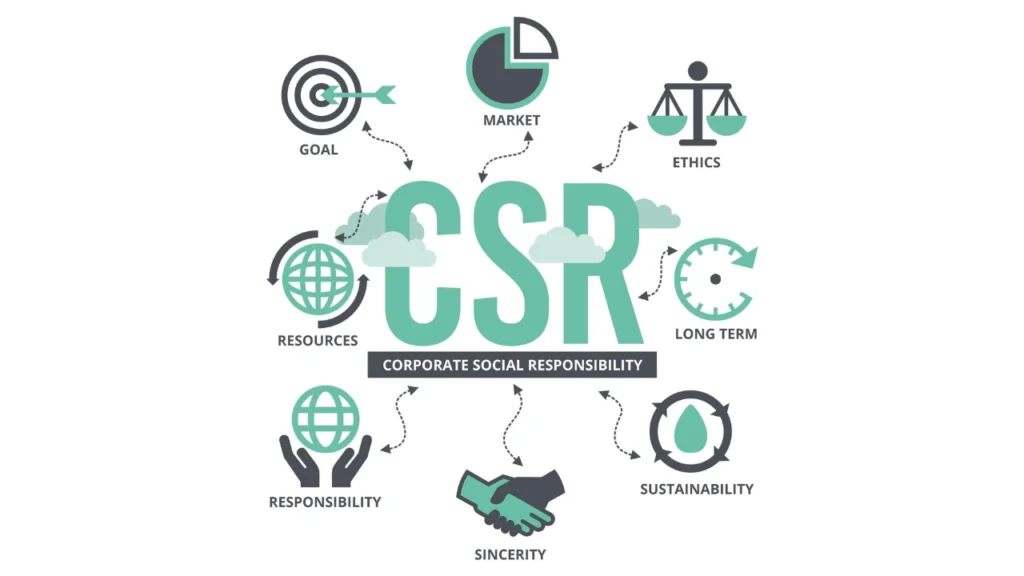In recent years, corporate social responsibility (CSR) has moved from the sidelines to the core of how forward-thinking businesses operate. It’s no longer just a feel-good add-on; it’s a strategic imperative that connects purpose with performance.
As a CSR consulting firm, we work closely with companies to develop clear, focused, and impact-driven CSR approaches that align with both community needs and business goals. Whether you’re building your first program or refining an existing one, understanding the objectives of CSR is the first step.
A well-planned CSR approach starts with strong program design. It’s what turns values into action and makes sure that initiatives are grounded, targeted, and scalable over time.
About Corporate Social Responsibility (CSR)
So, what’s corporate social responsibility? CSR refers to a company’s responsibility to contribute to the well-being of society beyond just generating profit. This includes how it treats its employees, the communities it operates in, and the impact it has on the environment.
In India, CSR became more formalized through the Companies Act, 2013, which requires eligible companies to invest in socially beneficial activities. These can include education, healthcare, environmental conservation, and more. This shift has made corporate social responsibility in India both a legal obligation and a tool for long-term value creation.
CSR isn’t one-size-fits-all. Its scope depends on the company’s values, sector, and stakeholder priorities. But at its core, it’s about creating a balance between profit-making and social accountability. Understanding what is CSR in business starts with recognizing that it’s not a separate function. When done right, CSR is embedded across departments—from HR and procurement to operations and communications.
The Role of CSR in Business

The role of CSR is evolving from philanthropy to strategic impact. Today, CSR plays several critical functions within a business:
- Strengthening Stakeholder Trust: Customers, investors, and employees are more likely to support companies that show social and environmental responsibility
- Risk Mitigation: Companies that ignore societal and environmental issues face reputational and regulatory risks. CSR helps identify and address these proactively.
- Building Brand Value: A strong CSR narrative can shape public perception and differentiate a brand in crowded markets.
CSR is an essential part of how companies manage long-term risk and opportunity. That’s why many organizations invest in social impact management to guide how they structure and evaluate their CSR initiatives internally and externally.
Key Objectives of Corporate Social Responsibility

Understanding the objectives of CSR is essential for any business aiming to go beyond transactional giving and toward long-term, meaningful engagement. These objectives help guide CSR planning, measure progress, and demonstrate accountability to both internal and external stakeholders.
Here are the key objectives of corporate social responsibility every business should consider:
1. Strengthen Community Well-being
One of the primary goals of CSR is to improve the quality of life in communities where a company operates. This can involve investing in healthcare, education, infrastructure, or livelihood support. The idea is simple: when communities thrive, businesses benefit too.
These initiatives are most effective when they are based on local needs and backed by ongoing social impact evaluation. In this way, companies aren’t just funding projects, but are also tracking whether those projects actually solve real problems.
2. Promote Environmental Sustainability
Environmental responsibility has become a core part of any serious corporate social responsibility strategy. This includes reducing carbon footprints, managing waste, conserving resources, and supporting renewable energy solutions.
CSR programs often aim to restore balance between industrial activity and environmental health, an increasingly important objective as both regulators and consumers become more climate-conscious.
3. Support Inclusive Growth
CSR should promote equity. This means creating opportunities for marginalized groups, supporting small businesses, and ensuring fair labour practices throughout the supply chain. Inclusive growth is not just about ticking a box, it’s about embedding fairness into how a business operates.
Some companies even extend this by supporting capacity development for local nonprofits, entrepreneurs, or partner organizations to build stronger, self-sustaining ecosystems.
4. Foster Ethical Business Practices
CSR reinforces the need for companies to operate with integrity. This includes transparency in governance, fair treatment of employees, and honest engagement with customers and partners. It ties closely to a company’s values and builds trust in the brand over time.
One of the objectives of corporate social responsibility is to create systems where ethical behaviour becomes the norm, not an exception. From responsible marketing to inclusive workplace culture, ethical practices are a foundational layer of a company’s reputation. Businesses that actively embed these values into their operations are more resilient in the face of public scrutiny and shifting stakeholder expectations.
5. Build Stakeholder Trust and Engagement
A key objective of CSR is to strengthen relationships with the people and groups that matter most to a business—employees, customers, suppliers, investors, and local communities. Trust is built when companies show up consistently, listen actively, and contribute to causes that resonate with their stakeholders.
When stakeholders feel heard and valued, it improves loyalty, reduces friction, and often leads to valuable collaboration. Many businesses use stakeholder engagement as the foundation for their corporate social responsibility strategy so that CSR activities aren’t top-down but shaped by those they aim to benefit
6. Drive Long-Term Social Impact
At the heart of CSR is a commitment to create measurable, long-lasting change. This is where having strong systems for monitoring and evaluation becomes essential. They help companies understand what’s working, what needs improvement, and where they can scale their impact.
Fulfilling CSR objectives means going beyond short-term activities to build programs that evolve over time. Businesses that take this approach often see stronger outcomes and better alignment with their corporate social responsibility strategy.
Business Benefits of Implementing Corporate Social Responsibility
While CSR is about doing the right thing, it also delivers clear business value. Here are a few of the key benefits of corporate social responsibility:
Reputation and Brand Loyalty
Companies that invest in social and environmental issues are often more trusted by customers and communities. It’s a visible commitment to values that many consumers now expect.
Employee Engagement and Retention
People want to work for companies that care. CSR initiatives improve morale, offer meaningful engagement opportunities, and help attract talent, especially among younger generations.
Risk Mitigation
Whether it’s environmental regulation, community resistance, or reputational damage, proactive CSR can help reduce exposure to risk and conflict. This proactive approach also contributes in increasing the goodwill of the business.
Better Access to Capital and Partnerships
Investors and financial institutions are increasingly looking at non-financial indicators, including CSR performance. It also opens doors for collaboration with governments, NGOs, and multilateral agencies.
Companies that see CSR as part of their strategy and not a side project tend to see stronger returns, both in impact and in business outcomes. This is where support from a knowledgeable CSR consulting firm can bring focus and clarity to execution.
Interesting Reads: Importance of Corporate Social Responsibility for Long-Term Business Growth
Examples of CSR in Action
As a top CSR consulting firm, we’ve seen exceptional examples of corporate social responsibility done right. Some of them are:
JM Financial Foundation – Integrated Village Development Program
In Maharashtra’s Mokhada block, JM Financial Foundation’s Integrated Village Development Program (IVDP) has enhanced agricultural productivity and livelihoods. By facilitating access to government schemes and providing resources like seeds and training, the program benefited 909 farmer households over three years. A strong example of corporate social responsibility in India.
Shapoorji Pallonji Finance Pvt Ltd – Women Entrepreneurship and Water Management
Collaborating with Swayam Shikshan Prayog, this initiative empowered women entrepreneurs in Maharashtra’s Latur and Osmanabad districts. The program supported businesses such as dairy, tailoring, and grocery stores, leading to increased income and self-reliance among participants. It reflects inclusive CSR activities aligned with local needs.
Read More: Shapoorji Pallonji Finance Pvt Ltd | Impact Assessment – The4thWheel
Larsen & Toubro (L&T) – Skill Development and Community Initiatives
L&T’s CSR efforts across India have focused on skill development, education, and community welfare. Notably, their Construction Skills Training Institutes achieved a Net Promoter Score of 87, reflecting high satisfaction among trainees. A standout among examples of corporate social responsibility that build long-term capacity.
Read More: L&T CSR Impact Assessment Across India | 4th Wheel
How to Align CSR with Your Business Strategy

A strong corporate social responsibility strategy is never an afterthought. It’s tied directly to business values, goals, and operations. Here’s how companies can make that alignment meaningful and practical:
1. Identify Overlapping Priorities
Find the intersection between community needs and your company’s strengths. For example, a tech firm might focus on digital literacy, while a logistics company could support rural connectivity or supply chain sustainability.
2. Use Data to Drive Decisions
Base CSR plans on data—community assessments, stakeholder input, and industry benchmarks. This makes sure that the initiatives are targeted and relevant. Embedding monitoring & evaluation early on supports data-backed decision-making throughout the project lifecycle.
3. Involve Internal Teams
CSR isn’t just for one department. Involve employees, business units, and leadership in shaping and participating in CSR efforts. This builds ownership and reinforces values from the inside out.
4. Set Clear, Measurable Goals
Treat CSR like any other business investment. Define goals, timelines, and KPIs. Use them to assess progress and communicate results transparently.
When done right, aligning CSR with business strategy doesn’t just meet compliance, it creates shared value for the company, community, and the broader ecosystem.
Read Next
- 10 Critical CSR Strategy Elements That Drive Business Impact
- Leveraging Impact Assessment & Data Driven Insights for CSR spends in India
- The Role of NGOs in CSR – The4thWheel
Conclusion
Understanding the objectives of CSR helps companies move beyond reactive giving and toward strategic, long-term impact. Be it supporting local livelihoods, improving access to education, or building a more ethical supply chain, CSR is a practical tool for aligning business success with social responsibility.
When done well, CSR is not just about compliance. It’s a way to build trust, strengthen communities, and shape a more sustainable future. The key is to root every initiative in local context, back it with evidence, and align it with company values.
At 4th Wheel, we support businesses in building meaningful CSR strategies through services like CSR consultancy, program planning, and long-term impact tracking. If you’re looking to strengthen your company’s approach to social responsibility, we’re here to help.Talk to our team to see how we can support your goals with data-driven, people-first CSR solutions




